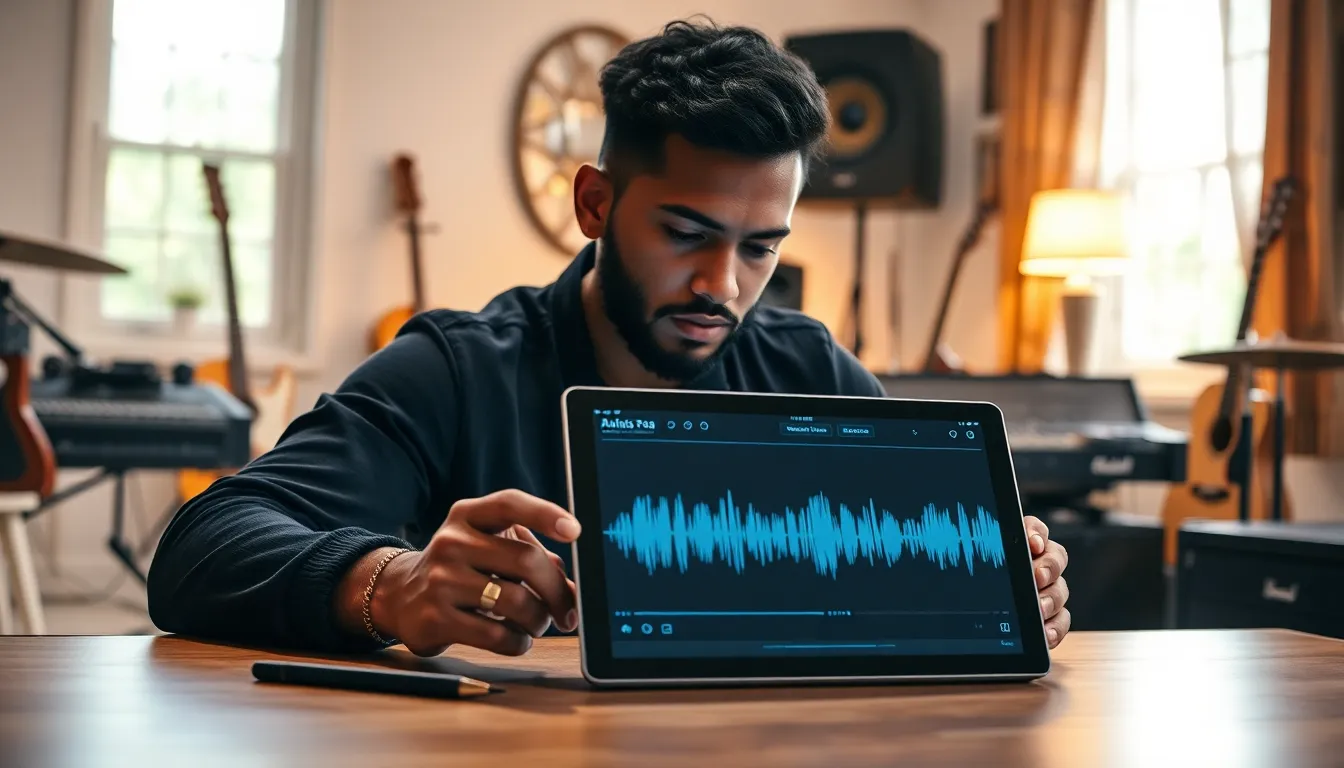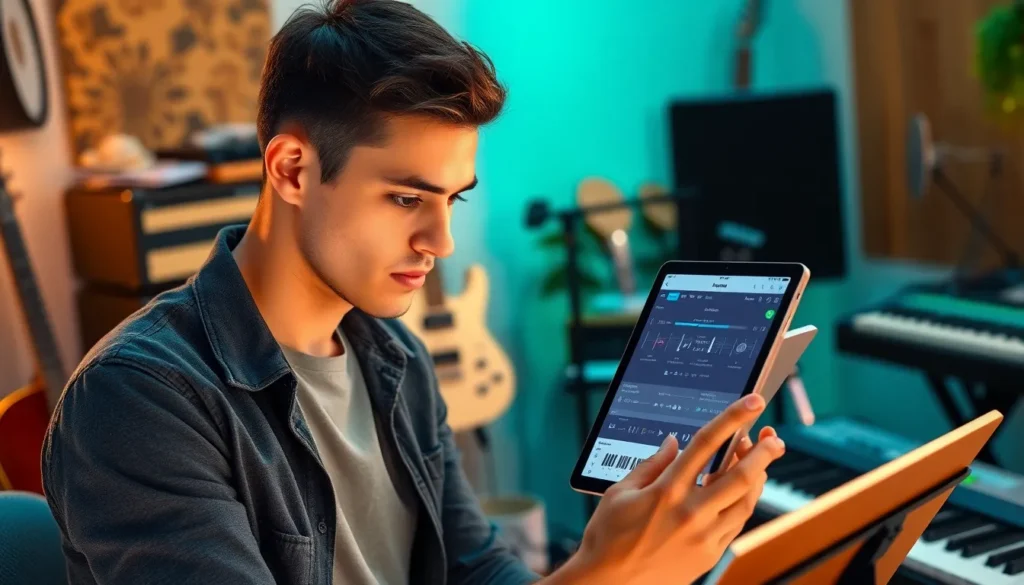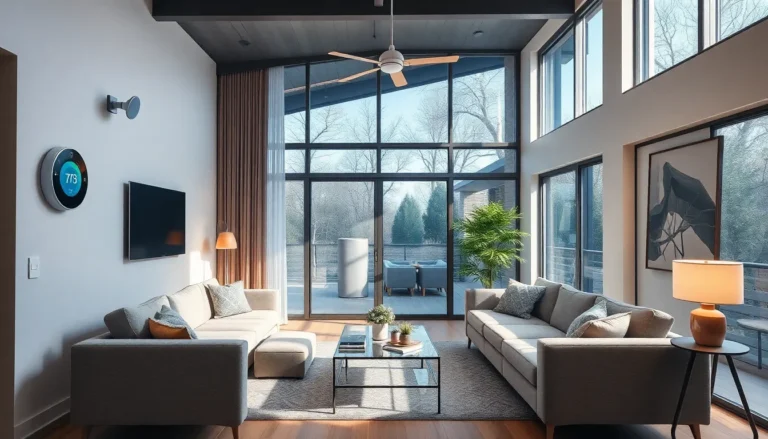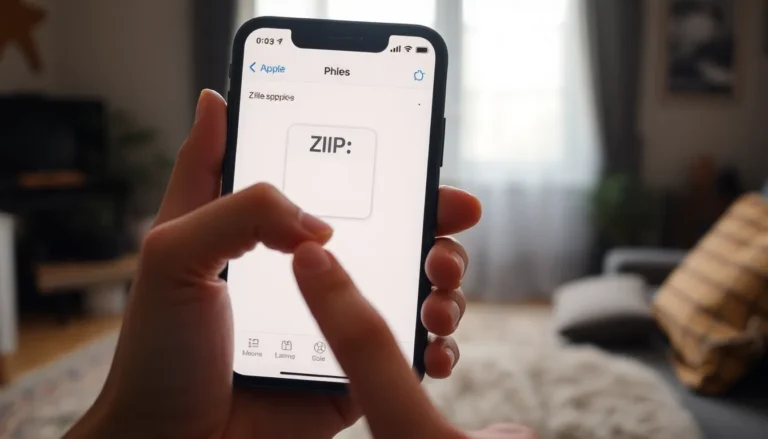Table of Contents
ToggleIn a world where music flows like water, having the right tools can make all the difference. Enter the tablet—a sleek, portable powerhouse that transforms the way musicians create, consume, and connect with their art. Whether it’s composing a symphony or curating the perfect playlist for a road trip, a tablet packs the punch to keep the rhythm alive.
Imagine strumming your guitar while jotting down lyrics, or mixing tracks on the go without the hassle of lugging around heavy equipment. With vibrant displays and endless apps, these devices are like Swiss Army knives for music lovers. It’s time to trade in that dusty old CD player for a device that can do it all—because who wants to be stuck in the past when the future of music is just a swipe away?
Overview of Tablets for Music
Tablets play a significant role in modern music creation. Musicians often find tablets convenient for composing, recording, and performing. Various models cater to different needs, including portability, functionality, and display quality.
Popular operating systems include iOS and Android, each offering a vast selection of music applications. Tablets come equipped with high-quality speakers and vibrant screens, enhancing user experience significantly.
Many musicians utilize tablet-specific apps for multitouch capabilities, allowing users to play multiple instruments at once seamlessly. Audio interfaces connect tablets to traditional instruments, expanding creative possibilities further.
Organizations such as Apple and Samsung consistently update their devices, ensuring optimal performance for music production. Acoustic musicians thrive with apps like GarageBand, while electronic music producers benefit from Ableton Live and FL Studio.
Battery life remains a critical factor; tablets with longer battery life support extended practice and performance sessions. User preferences vary, but lightweight models often attract on-the-go artists looking for efficient solutions.
Pricing also influences decisions; mid-range options offer sufficient features without breaking the bank. Consumers should evaluate their specific needs and select a tablet that aligns with their musical ambitions.
Tablets integrate with cloud services, facilitating easy storage and sharing of music files. Collaborative tools in many apps allow musicians to work together from different locations, bridging gaps between artists.
Key Features to Consider

When selecting a tablet for music, several key features play a crucial role in enhancing the user experience. Musicians benefit from a thorough understanding of these components.
Display Quality
High display quality greatly impacts usability. Brightness and color accuracy enhance the ability to read sheet music or visualize audio waveforms clearly. Consider tablets with at least a 10-inch screen for better viewing comfort. Retina displays on models like the iPad Pro offer excellent resolution. Additionally, several devices support stylus input, helping musicians write or edit scores more effectively. Resolution ratios of 2048 x 2732 pixels or higher ensure sharp imagery, improving creativity.
Processing Power
Powerful processors enable smooth multitasking. Tablets featuring at least an octa-core processor handle demanding music production apps efficiently. A minimum of 4GB RAM is often necessary for seamless operation and quick app launches. Devices with advanced chips, such as Apple’s M1 or Qualcomm’s Snapdragon, can support high-performance tasks effortlessly. Delays while composing or mixing tracks diminish significantly with robust processing capabilities. This ensures that musicians maintain their creative flow without interruptions.
Battery Life
Long battery life proves essential for extended practice sessions. Tablets with a minimum of 10 hours of battery life allow musicians to perform or compose without worrying about charging interruptions. Features such as low-power mode and energy-efficient screens also contribute to longevity. Selecting lightweight models not only enhances portability but also helps ensure that weight doesn’t impede mobility during on-the-go sessions. Being able to rely on a tablet throughout an entire rehearsal enhances overall productivity for any artist.
Best Tablets for Music in 2023
Tablets have become indispensable for music creation and production. The following models are top contenders for musicians in 2023.
Apple iPad Pro
Apple’s iPad Pro stands out for its impressive performance and vibrant display. Equipped with M1 or M2 chips, it offers exceptional processing power for demanding music applications. The 12.9-inch Liquid Retina XDR screen delivers stunning visuals, making it easy to read sheet music and detailed waveforms. Additionally, the compatibility with Apple Pencil enhances precision during composition and editing. Musicians benefit from a wide range of apps tailored to various genres, ensuring that creativity thrives.
Samsung Galaxy Tab S8
Samsung’s Galaxy Tab S8 offers a versatile solution for music professionals. Featuring an 11-inch LCD display, it provides excellent color accuracy for visual tasks. The Qualcomm Snapdragon 8 Gen 1 processor ensures efficient multitasking between music apps. Enhanced usability comes from the included S Pen, allowing musicians to jot down ideas or make quick edits. This tablet also supports Samsung DeX, enabling a desktop-like experience for serious compositions. With robust battery life, musicians can rely on it during long practice sessions.
Microsoft Surface Pro 9
The Microsoft Surface Pro 9 combines the functionality of a laptop with a tablet’s versatility. Boasting a 13-inch PixelSense display, it supports touch and stylus input for easy navigation. The powerful Intel Core processors offer seamless performance while running multiple music production software simultaneously. Portability is a key feature, as it easily transforms between a tablet and a laptop with a detachable keyboard. With charging options and connectivity features, this model accommodates various musical setups efficiently.
Advantages of Using Tablets for Music
Portability stands out as a primary advantage of tablets. Musicians can easily carry them, enabling music creation on the go. Versatility plays a significant role, as tablets support a broad range of music applications for different genres. Vibrant displays allow for better visualization of audio waveforms and sheet music.
High-quality speakers integrated into many tablets improve listening experiences. Battery life is crucial in long practice and performance sessions, with models exceeding 10 hours ideal for uninterrupted workflow. Collaborative tools within various apps simplify remote cooperation among musicians.
Processing power remains essential for efficient multitasking. Tablets with octa-core processors handle demanding music production apps seamlessly. Users benefit from regular updates provided by manufacturers like Apple and Samsung, ensuring optimal performance.
Specific apps designed for different musical genres enhance the creative process. GarageBand serves acoustic musicians well, while electronic producers often prefer Ableton Live and FL Studio. Pricing influences decisions, and mid-range models deliver adequate features for many artists.
Storage and sharing become effortless with cloud integration. Musicians can easily back up their work, ensuring accessibility from various devices. Selecting a tablet with at least a 10-inch screen supports better usability for all music-related tasks.
Experiencing these advantages encourages many to choose tablets as their primary music production tools.
Tablets have revolutionized how musicians create and interact with music. Their portability and versatility make them indispensable tools for anyone from casual listeners to professional artists. With a variety of models available tailored to different needs and preferences, musicians can find the perfect device to suit their creative process.
The integration of high-quality apps and features enhances the overall experience, allowing for seamless composition and collaboration. As technology continues to evolve, tablets will undoubtedly play an even more significant role in shaping the future of music production. Embracing these devices can lead to new creative possibilities and a more connected musical community.







